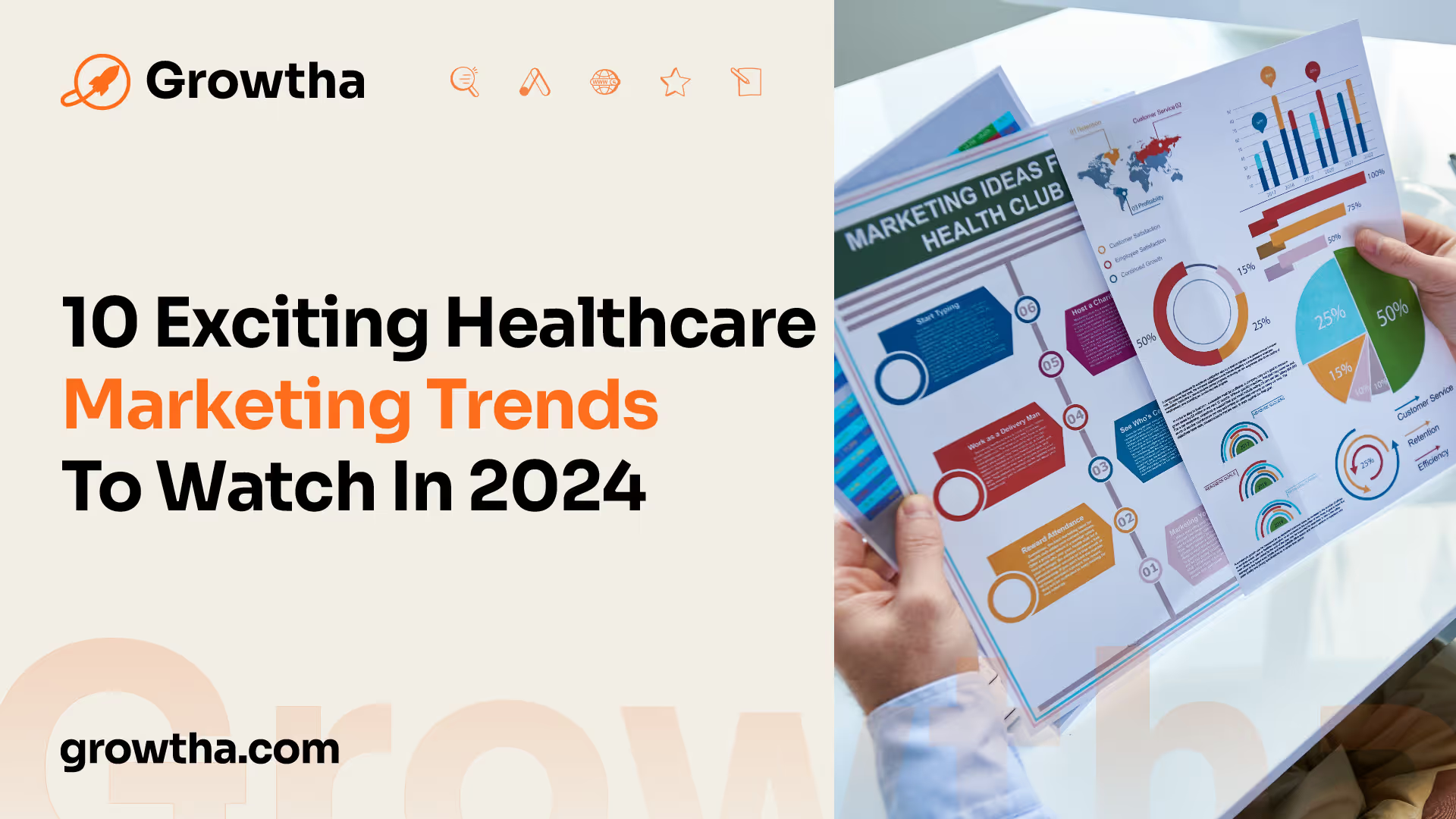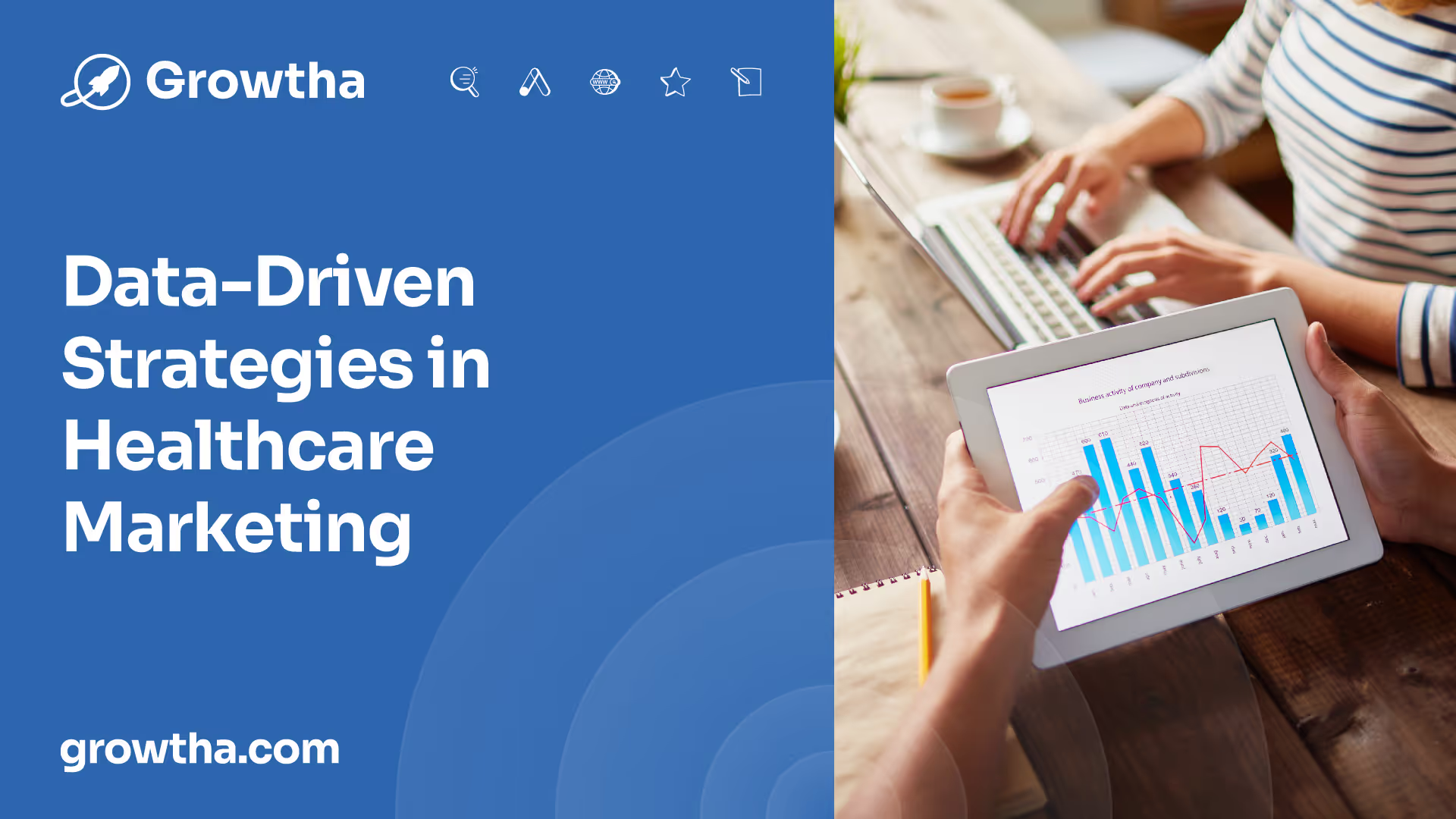10 Exciting Healthcare Marketing Trends To Watch In 2024
As the healthcare industry continues to evolve, so does the field of healthcare marketing.


10 Exciting Healthcare Marketing Trends To Watch In 2024
Emerging Trends in Healthcare Marketing
As the healthcare industry continues to evolve, so does the field of healthcare marketing. In 2024, several exciting trends are set to shape the landscape of digital marketing in healthcare, providing new opportunities to engage with patients and enhance their overall experience. Let's explore some of these emerging trends.
Personalized Content for Enhanced Patient Experience
Personalization will remain a key trend in healthcare marketing in 2024, as patients increasingly expect customized experiences throughout their healthcare journey. By tailoring content to individual preferences and needs, healthcare providers can create a more meaningful connection with their audience and improve patient engagement. Personalized content can include targeted emails, tailored website experiences, and customized educational materials. By understanding patients' unique circumstances, healthcare providers can deliver information that is relevant and valuable to their specific needs.
The Role of Chatbots and Artificial Intelligence
Chatbots and artificial intelligence (AI) technology are expected to play a significant role in healthcare marketing in 2024. These tools provide personalized and quick responses to patient inquiries, allowing healthcare organizations to deliver timely information and support. Chatbots can assist with appointment scheduling, provide answers to frequently asked questions, and offer recommendations based on individual patient data. By utilizing AI-driven chatbots, healthcare providers can improve patient satisfaction and streamline communication processes.
Harnessing the Power of Video Marketing
Video marketing is set to become increasingly popular in healthcare marketing in 2024. Videos offer engaging and easily digestible content for healthcare consumers, allowing them to absorb information in a visually appealing manner. Healthcare organizations can leverage videos to educate patients about various conditions, treatments, and procedures. Additionally, video testimonials from satisfied patients can help build trust and credibility. With the rise of platforms like YouTube and TikTok, healthcare providers have ample opportunities to reach and connect with their target audience through video content.
Engaging with Virtual Events and Webinars
Virtual events and webinars will be a key trend for healthcare marketing in 2024. These platforms provide opportunities for education, networking, and engagement with patients and healthcare professionals. Virtual events allow healthcare organizations to host conferences, workshops, and seminars online, reaching a broader audience without the limitations of physical location. Webinars offer a convenient way to share valuable insights, provide expert advice, and address patient concerns. By embracing virtual events and webinars, healthcare providers can foster meaningful connections and stay at the forefront of industry trends.
Leveraging Influencers for Credibility and Reach
The use of influencers in healthcare marketing is expected to grow in 2024. Influencers can help healthcare organizations reach a broader audience and build credibility in the industry. By partnering with influencers who have a strong presence in the healthcare space, providers can leverage their expertise and following to expand their reach. Influencers can share personal experiences, educational content, and recommendations, creating a sense of trust and authenticity. Collaborating with influencers allows healthcare organizations to tap into a loyal and engaged audience, driving brand awareness and patient engagement.
These emerging trends in healthcare marketing offer exciting possibilities for healthcare providers to connect with patients, deliver personalized experiences, and stay ahead in a rapidly evolving digital landscape. By embracing these trends, healthcare organizations can strengthen their marketing strategies and enhance patient engagement in 2024 and beyond.

The Impact of Technology in Healthcare Marketing
As technology continues to advance, it has a profound impact on healthcare marketing. In this section, we will explore four key areas where technology is shaping the future of healthcare marketing: the rise of Internet of Medical Things (IoMT), the potential of Artificial Intelligence (AI), exploring Augmented Reality (AR) and Virtual Reality (VR), and the growth of telemedicine.
The Rise of Internet of Medical Things (IoMT)
The Internet of Medical Things (IoMT) refers to the connected network of medical devices and healthcare systems that collect and transmit data for monitoring, diagnosis, and treatment purposes. By 2021, the global IoMT market is predicted to reach $136.8 billion, showcasing the growth and potential impact of wearable devices and IoMT in the healthcare industry.
IoMT plays a significant role in healthcare marketing by providing valuable data that can be leveraged to personalize patient experiences and improve outcomes. With the help of IoMT devices, healthcare marketers can gather real-time patient data, such as vital signs, activity levels, and medication adherence. This data can then be used to tailor marketing campaigns and deliver personalized healthcare messages to patients.
The Potential of Artificial Intelligence (AI)
Artificial Intelligence (AI) has the potential to revolutionize healthcare marketing. Accenture predicts that by 2026, top AI applications in healthcare may save the industry $150 billion per year, highlighting the cost-saving potential of AI systems in the field. Additionally, AI has the capacity to meet the 20% of unmet clinical demand [1].
AI-powered algorithms can analyze vast amounts of patient data to identify patterns, predict patient behavior, and develop personalized marketing strategies. By leveraging AI, healthcare marketers can deliver targeted content, recommend relevant products or services, and improve patient engagement and satisfaction.
Exploring Augmented Reality (AR) and Virtual Reality (VR)
Augmented Reality (AR) and Virtual Reality (VR) technologies are gaining traction in healthcare marketing. From 2018 to 2023, the value of the healthcare-based AR and VR industry is expected to increase from $933 million to $3.2 billion, suggesting a significant rise in the adoption and application of augmented reality and virtual reality in healthcare.
AR and VR can create immersive experiences for patients, enabling them to visualize medical procedures, explore healthcare facilities, or engage in interactive health education. Healthcare marketers can utilize these technologies to provide engaging and informative content, enhancing patient understanding and involvement.
The Growth of Telemedicine
Telemedicine, the practice of delivering healthcare remotely through telecommunication technologies, is experiencing rapid growth. The global telemedicine industry is projected to be worth more than $66 billion by 2021, indicating substantial investment in telehealth technology to improve access to healthcare.
Telemedicine offers new avenues for healthcare marketing, allowing providers to reach patients in remote locations or those with limited mobility. Through telemedicine platforms, healthcare marketers can promote virtual consultations, online healthcare services, and remote monitoring solutions. This enables patients to access healthcare conveniently and enhances patient engagement and satisfaction.
By embracing the rise of IoMT, harnessing the potential of AI, exploring AR and VR technologies, and leveraging telemedicine, healthcare marketers can stay at the forefront of digital transformation in the industry. These technological advancements open up new opportunities for personalized marketing, improved patient experiences, and enhanced healthcare delivery.

Data-Driven Strategies in Healthcare Marketing
In the ever-evolving landscape of healthcare marketing, data-driven strategies have become instrumental in effectively reaching and engaging with target audiences. By leveraging data and analytics, healthcare organizations can tailor their messaging, optimize user experience, and enhance patient engagement. In this section, we will explore several data-driven strategies that are expected to shape healthcare marketing in 2024.
Personalization for Targeted Messaging
Personalization has evolved significantly over the past five years in healthcare marketing and is expected to continue as a top trend in 2024. By utilizing customer data and segmentation, healthcare organizations can deliver targeted messaging to specific audiences, creating a more personalized and relevant experience for patients [2]. This approach allows organizations to tailor their communications to individual patient needs, preferences, and demographics, ultimately fostering stronger connections and increasing patient satisfaction.
Voice Search Optimization
As voice assistants and voice search technology continue to gain prominence, optimizing healthcare marketing strategies for voice search is becoming increasingly important. People are increasingly using voice commands to search for healthcare information, find medical services, and even book appointments. By incorporating voice search optimization techniques into their digital content, healthcare organizations can enhance their visibility and ensure that they appear in voice search results. This includes adapting content to match the conversational nature of voice queries and focusing on long-tail keywords and natural language phrases.
Leveraging Social Media for Patient Engagement
Social media plays a vital role in healthcare marketing, offering a platform for healthcare organizations to engage with patients and convey valuable healthcare information. According to a survey, 57% of consumers indicated that a medical facility's social media presence would strongly influence their choice of medical services provider. By strategically utilizing social media platforms, healthcare organizations can share educational content, health outcomes, patient testimonials, and more, effectively reaching and engaging with their target audience. Building a strong social media presence allows organizations to establish credibility, foster patient trust, and maintain an ongoing conversation with patients.
Enhancing User Experience with Engaging Websites
An attractive website layout and engaging content are crucial for maintaining user interest in healthcare marketing. Research shows that 38% of people will stop exploring a website if the layout is unattractive or the content is not engaging. To create a positive user experience, healthcare organizations need to focus on designing visually appealing websites with intuitive navigation, clear calls-to-action, and relevant content. Incorporating features like two-way chat, online appointment scheduling, access to medical records, and educational content in consumer-favored formats such as videos and animations can further enhance user satisfaction and encourage patient engagement.
By embracing data-driven strategies in healthcare marketing, organizations can unlock valuable insights, personalize their messaging, optimize user experience, and foster meaningful patient engagement. As technology continues to advance, healthcare marketers will need to stay agile, adapt to evolving trends, and leverage data to deliver impactful and patient-centric marketing campaigns.
Innovative Approaches in Healthcare Marketing
As the healthcare industry continues to evolve, innovative approaches in marketing are essential to effectively reach and engage with patients. In this section, we will explore several exciting trends that are expected to shape healthcare marketing in 2024.
The Power of Video Testimonials and Patient Stories
Video testimonials and patient stories are becoming increasingly powerful tools in healthcare marketing. Videos offer engaging and easily digestible content for healthcare consumers, allowing them to connect with real-life experiences and emotions. By sharing stories of successful treatments, compassionate care, and positive outcomes, healthcare providers can inspire trust and confidence in their services.
According to Cardinal Digital Marketing, video marketing is set to become even more popular in 2024. Healthcare organizations can leverage this trend by creating compelling video testimonials that showcase patient journeys, highlight treatment outcomes, and emphasize the quality of care provided.
Account-Based Marketing (ABM) for Targeted Outreach
Account-Based Marketing (ABM) is an increasingly effective strategy in healthcare marketing. By collaborating with influencers, healthcare providers can reach a wider audience, boost credibility, and promote health-related products and services. Social media influencers and healthcare professionals can work together to create engaging content, share information, and raise awareness about particular healthcare topics or initiatives.
According to Edkent Media, the collaboration between healthcare providers and influencers is set to increase in 2024. This partnership allows healthcare organizations to tap into the influencer's existing audience, enhancing their brand visibility and credibility.
The Rise of Chatbots and Conversational AI
Chatbots and conversational artificial intelligence (AI) are transforming the way healthcare organizations interact with patients. These technologies offer personalized and quick responses to patient inquiries, providing instant support and information. Chatbots can assist with appointment scheduling, answer frequently asked questions, and provide guidance on common health concerns.
According to Cardinal Digital Marketing, the use of chatbots and AI technology will play a significant role in healthcare marketing in 2024. These tools not only enhance patient experience by providing immediate access to information but also free up staff resources for more complex tasks.
Leveraging Patient Advocacy for Trust and Credibility
In healthcare marketing, patient advocacy is gaining momentum as a means to build trust and credibility. Healthcare providers are empowering patients to share their stories and experiences, demonstrating the positive impact their services have had on their lives. Patient testimonials and advocacy initiatives can help potential patients identify with others who have faced similar health challenges and find reassurance in their decision-making process.
By leveraging patient advocacy, healthcare organizations can humanize their brand and establish a connection with their target audience. According to LinkedIn, patient stories build trust, demonstrate empathy, and showcase the expertise and quality of care provided.
Innovative approaches like video testimonials, account-based marketing, chatbots, and patient advocacy are reshaping healthcare marketing. By embracing these trends, healthcare organizations can effectively engage with patients, build trust, and establish a strong brand presence in the evolving healthcare landscape.
Looking Ahead: Healthcare Marketing in 2024
As we look towards the future of healthcare marketing, several trends are set to shape the industry in 2024. These trends highlight the increasing importance of video content, voice search and voice assistants, the continual focus on personalization, and the growing role of artificial intelligence (AI) and machine learning.
The Dominance of Video Content
Video marketing is expected to take center stage in healthcare marketing campaigns in 2024. Videos offer engaging and easily digestible content for healthcare consumers, allowing for more impactful communication and storytelling [4]. This form of media enables healthcare organizations to connect with their audience on a deeper level, increasing brand awareness and establishing stronger connections.
The Influence of Voice Search and Voice Assistants
Voice search is on the rise, with an increasing number of people utilizing voice search features on search engines. In fact, 58% of individuals aged 25-40 are already using voice search. To stay relevant, healthcare marketers need to adapt their content marketing strategies to accommodate this trend. Optimizing content for voice searches in 2024 will be crucial in ensuring that healthcare information is easily accessible and discoverable by voice search users.
The Continual Importance of Personalization
Personalization remains a key focus in healthcare marketing. Tailoring the patient experience and delivering personalized messaging is an effective way to engage and connect with healthcare consumers. In fact, 87% of healthcare marketers are already leveraging personalization in their campaigns to create a tailored experience for patients and consumers. By understanding the unique needs and preferences of their audience, healthcare organizations can provide relevant and meaningful content, ultimately enhancing patient satisfaction and loyalty.
The Role of AI and Machine Learning
Artificial intelligence (AI) and machine learning are revolutionizing healthcare marketing strategies. These technologies enable marketers to analyze data, predict outcomes, and automate tasks, leading to more efficient and effective campaigns [5]. By harnessing the power of AI and machine learning, healthcare organizations can gain insights into consumer behavior, optimize marketing efforts, and deliver personalized experiences. This technology also holds the potential to improve patient care and outcomes by streamlining processes and enhancing decision-making.
In summary, the future of healthcare marketing in 2024 will be shaped by the dominance of video content, the influence of voice search and voice assistants, the continual importance of personalization, and the growing role of AI and machine learning. By staying abreast of these trends and leveraging them effectively, healthcare marketers can drive engagement, build trust, and ultimately improve the overall patient experience.
References
[1]: https://www2.stardust-testing.com/en/the-digital-transformation-trends-and-challenges-in-healthcare
[2]: https://ohsmagnet.com/36198/showcase/the-evolution-of-trends-over-the-past-five-years/
[3]: https://www.weareamnet.com/blog/healthcare-marketing-trends/
[4]: https://www.cardinaldigitalmarketing.com/healthcare-resources/blog/healthcare-marketing-trends-2024/
[5]: https://edkentmedia.com/top-healthcare-marketing-trends-to-watch-for-in-2024/







